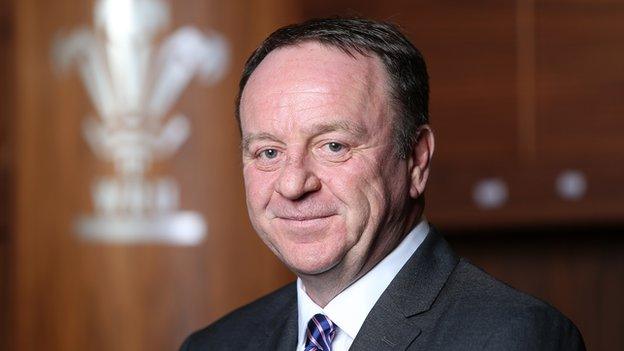Welsh Rugby Union: Chief executive Steve Phillips says union not settling for domestic mediocrity
- Published

Steve Phillips took over from Martyn Phillips as the new Welsh Rugby Union chief executive
Welsh Rugby Union chief executive Steve Phillips insists he is not settling for mediocrity among the nation's professional sides.
Wales won another Six Nations title in 2021 but saw the four regional sides lose in European competition in the last 16.
"Do I accept mediocrity for the regional game? No I don't. Frankly, who does?" said Phillips.
"That is not a conversation we have at the Professional Rugby Board (PRB)."
The PRB was set up in late 2018 to run the professional game in Wales and represents the WRU and the country's four regions - Cardiff Blues, Dragons, Ospreys and Scarlets.
The Welsh teams have not had the same success as the national side since the inception of regional rugby in 2003.
"Do we want Wales and the regions to do well? Absolutely we do," said Phillips.
"It's never been about one at the expense of the other. That's just not true."
The WRU has been criticised for the way it is funding the regions but Phillips insists they are doing enough in terms of finances and resources.
They took out a £20m loan in 2020 under the Coronavirus Large Business Interruption Loan Scheme (CLBILS).
The loan was to enable Wales' four professional teams to avoid financial collapse during the pandemic after the expected £26m funding to the regions dropped to £3m for the 2020-21 season, due to the impact of Covid.
Welsh rugby received a £13.5m grant from the Welsh government as part of its £17.7m funding package to help spectator sports in Wales impacted by the Covid-19 pandemic.
In November 2020, the four regions agreed how the original £20m loan would be shared between them with Scarlets receiving £5.5m, Cardiff Blues and Ospreys £5m each, and Dragons £4.5m.
The loan was negotiated by the WRU on behalf of the regions who are responsible for the repayments over a three-year period.
"The Covid crisis created a load of financial challenges," said Phillips.
"The PRA funding was £3m. We recognised that wasn't sustainable, so we went out to get a £20m loan. That wasn't straight-forward. It took a lot of time and effort.
"We also had welcome support from government. Accepting that part of this is loan, the regional game in Wales has had around £33m this year.
"Previous historical funding would have been around £20m."
Welsh Rugby Union: Chief executive Steve Phillips promises investment in the women's game
The governing body have been criticised for putting the loan liability back on the regions.
"We are currently working to re-negotiate and re-finance the loan," said Phillips.
"The Professional Rugby Agreement funding is the PRA funding. So there is no sense that we should have done something that we didn't.
"We realised the PRA funding wasn't going to be sustainable, so we went to great lengths to secure the £20m loan.
"The question being asked is who should bear the loan repayments but it probably doesn't matter because it's the WRU who will generate the money that will fund the repayments.
"Where the debt sits is a little bit of a neither here nor there.
"The mood music is regional finances have been inhibited by the loan repayments.
"But it kind of doesn't matter where the debt sits because the whole repayment has to come from the same place."
WRU critics have claimed the governing body are benefitting from using the region's players for free with the sides signing up to release them in the Professional Rugby Agreement (PRA).
"Everyone is allowed to make accusations but we are complying with the Professional Rugby Agreement (PRA) between ourselves and the regions," added Phillips.
"The PRA funding model is a risk and reward strategy. Sometimes it pays more, sometimes it pays less.
"As we went into Covid, there was less money to draw from because we didn't have any crowds and our sponsorship was down."
The WRU will receive £51m from the investment of private equity from CVC Capital Partners into the Six Nations. That investment will predominantly go into capital projects rather than being given to the regions.
"You are saying why don't you use £20m of the £51m to pay that because you are trying to close that loop but we are not coming from that place," said Phillips.
"We have dealt with the shortfall of the cash flow to the regions through the loan, so to then link it into something else doesn't make sense to me.
"With the CVC Six Nations deal, we have sold an asset and we have capital proceeds, which is different to income.
"Professional rugby needs sustainable income. If we don't invest the Six Nations capital proceeds wisely to provide an alternative income stream, we are all signing up for a year-on-year decline in regional funding.
"I am not signing up to that. It's tough enough for the regions as it is. To ask them to take a decline is not acceptable.
"I recognise some of the CVC Six Nations money will feed the game, which could mean the senior men's team, the regions, the women's game. It's getting the mix right.
"But, not to mislead, the majority will be needed to cover the future drop off in income, via investment in capital projects."